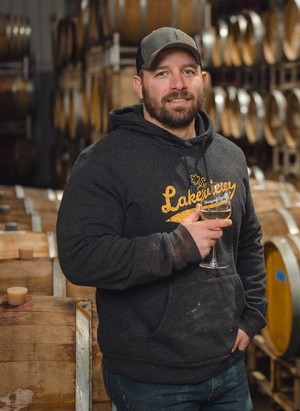Sustainable Agriculture in Vineyards: Techniques for Tomorrow's Wines
Sustainable Agriculture in Vineyards: Techniques for Tomorrow's Wines
Delve into the various dimensions of sustainable agricultural methods in vineyards with a talk with Vineyard Manager, Nick Florip. We asked Nick how different agriculture practices are not only preserving ecological balance but also enhancing the quality and resilience of grape cultivation. He explained innovative techniques that are paving the way for a more sustainable and prosperous future for wine production, ensuring that tomorrow's wine experiences are crafted with a mindful respect for the environment and a commitment to sustainable growth in the viticulture industry.
 How'd you first start incorporating sustainable practices in the vineyard?
How'd you first start incorporating sustainable practices in the vineyard?
Nick: We have used compost instead of granular fertilizers for quite a while. Leelanau County has primarily very sandy soil, granular fertilizers didn’t provide any organic material to the soil whereas compost provides additional nutrients, organic material and aids micro-organisms in the soil. We are also expanding and experimenting with cover crops pretty extensively.
What’s a cover crop?
Nick: Any crop grown to cover the soil and may be incorporated into the soil later for enrichment. We are trying to get at least 5 different cover crops established in rows before planting the vineyard.
What are some of the benefits of using cover crops?
Nick: First and foremost, cover crops help hold soil in place which reduces erosion. They can also increase organic matter and activate microorganisms in the soil. Those microorganisms help transfer specific nutrients from the soil to the plant.
Wildlife conservation and habitat preservation is something personally important to you, how do you see decisions made in the vineyard influencing that?
Nick: Those cover crops not only create food for pollinators like bees and butterflies in the summer they feed wildlife throughout the year. In the winter the daikon radishes that we plant to reduce soil compaction actually feed deer.
In what ways do you think sustainable practices benefit the local community as well as the vineyard?
Nick: Sustainable practices help keep water ways and ground water cleaner which is incredibly important in a state like Michigan. I also just find vineyards that incorporate biodiversity measures like cover crops prettier to look at than monocultures.
What is the biggest misconception people have about sustainable wine production that you’d like to debunk?
Nick: That it is unattainable or too expensive to execute.
Looking ahead, what exciting sustainable innovations do you see shaking up the current vineyard practices?
Nick: We are working on building a crimper which would reduce the amount of herbicides needed for new plantings. A crimper rolls over the cover crop once it has reached the wanted height. The goal is to have the crimper damage the stalk enough to terminate the cover crop and have it lay flat over the ground. This will act as a slow release green fertilizer, erosion protection, evaporation regulator, soil thermal regulator, weed deterrent and help with soil compaction.
Comments
Commenting has been turned off.Recent Posts
-
April 9, 2025
-
March 12, 2025
-
March 6, 2025
-
February 11, 2025
-
January 10, 2025
-
December 12, 2024
-
October 26, 2024
-
September 4, 2024
-
August 22, 2024
-
August 21, 2024